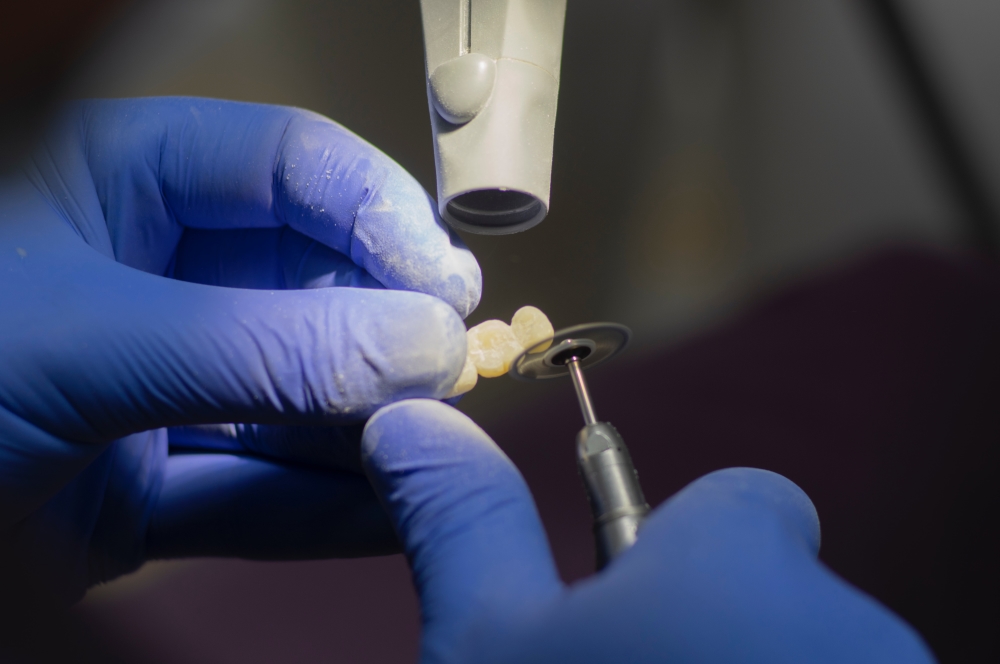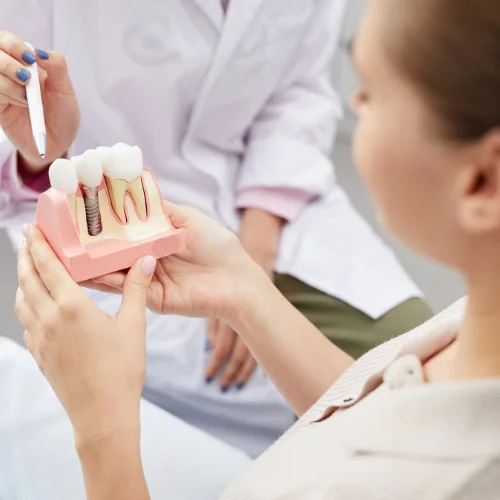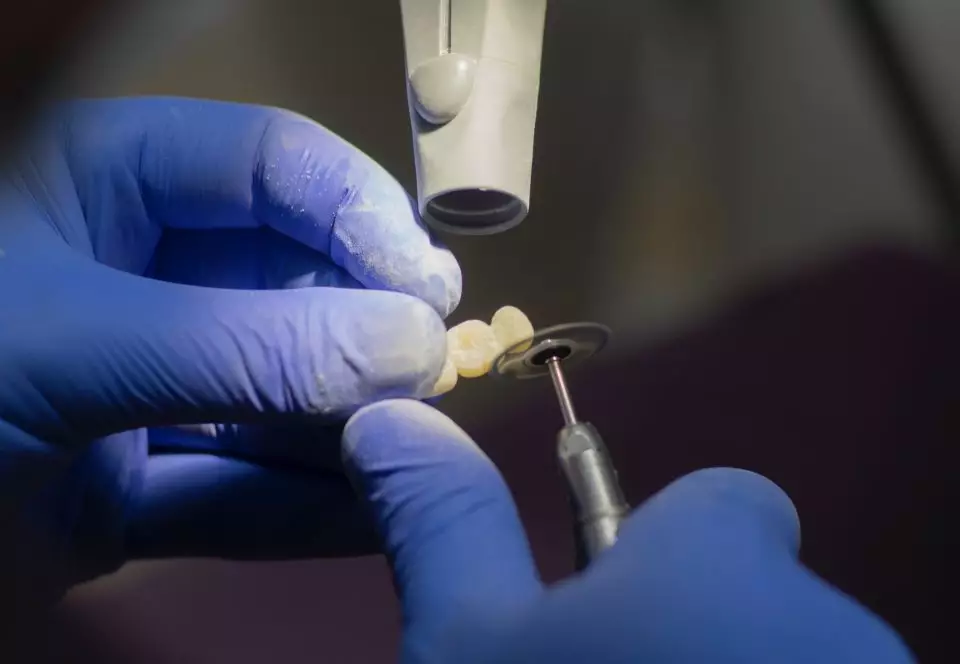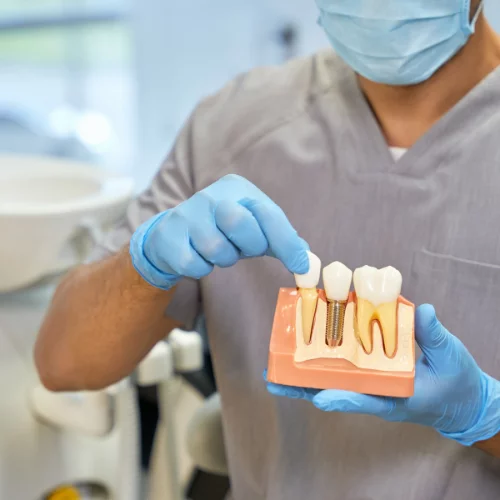
The Truth About Missing Front Teeth
March 18, 2024
Breaking Down the Dental Implant Process Timeline
April 3, 2024Key Takeaways:
Dental Implants Provide Long-Lasting Solutions:
Dental implants offer a long-term and resilient solution for tooth replacement. Their permanent fixtures become part of your jawbone, creating stability by mimicking natural tooth roots.
Improved Oral Health and Functionality:
Dental implants have an immensely positive effect on oral health by supporting the healing process, stimulating jawbone growth and halting its deterioration. Besides, it provides stability and durability enabling individuals to chew and speak comfortably.
Alternatives and Risks to Consider:
While dental implants offer many advantages, it’s crucial to carefully consider all possible alternatives as well as potential risks before making your decision.
Considering dental implants but unsure about the potential drawbacks?
We explore the advantages and disadvantages of dental implants to help you make an informed decision.
From the natural look and feel to the long-lasting solution they provide, we discuss everything you need to know.
Discover who may not be suitable candidates for dental implants and explore alternative options available.
Stay tuned to learn more about the pros and cons of dental implants.
What Are Dental Implants
Dental implants are prosthetic devices used for replacing missing teeth. They are surgically implanted into the jawbone to provide a stable foundation for artificial teeth.
These implants play a crucial role in dental restoration by mimicking the natural tooth root, offering support and stability for dental crowns, bridges, or dentures. The surgical procedure typically involves multiple steps, including initial consultation, implant placement, and prosthetic tooth attachment.
Unlike traditional dentures, implants integrate with the jawbone over time, promoting bone growth and preventing further deterioration. This integration process, known as osseointegration, ensures a secure and long-lasting solution for individuals seeking to restore their smile and improve oral function.
How Are Dental Implants Placed
The placement of dental implants involves a surgical procedure where the implant is securely embedded into the jawbone. This process allows for osseointegration, where the implant fuses with the bone for stability.
As the osseointegration progresses, typically taking around 3 to 6 months, the bone tissue grows around the implant, anchoring it firmly in place. During this healing period, it’s essential to follow post-operative care instructions provided by the dental surgeon to ensure proper recovery.
Patients may experience some swelling and discomfort immediately after the surgery, but this usually subsides within a few days. It’s crucial to attend follow-up appointments to monitor the healing process and ensure the implant integrates successfully with the surrounding bone.
Dental Implants Are Expensive Compared to Other Options
Dental implants are custom-made replacements for tooth roots made of titanium posts that are surgically placed into your jawbone. While they provide a permanent solution for missing teeth, the initial cost of dental implants tends to be significantly higher than other options like bridges or dentures. The total cost will depend on factors like the material used and the number of implants needed.
Initial Surgical Procedure
The initial surgical procedure to place the dental implants typically ranges from $1,000 to $3,000 per implant. The entire process can take 3 to 6 months to complete as the implants need to fuse with your jawbone during healing before the replacement teeth can be attached. This recovery period means multiple visits to your dentist, adding to the total cost.
Replacement Teeth
The final step is attaching the replacement teeth or tooth to the implants. The cost for the replacement teeth can range from $1,000 to $3,000 per tooth. The total cost will depend on the material you choose, such as porcelain fused to metal or all-porcelain. More complex implant procedures may cost $5,000 to $10,000 or more for the entire process.
Alternative Options to Consider
If the high upfront cost of dental implants is a concern, you may want to consider other more affordable options like dentures or bridges. Dentures typically cost between $500 to $3,000 per denture, while dental bridges average $500 to $1,500 per tooth. However, keep in mind that these options typically require replacement every 5 to 15 years, while dental implants can last a lifetime with good care. So, implants can end up costing you less over your lifetime.
In summary, while dental implants provide a long-term solution for missing teeth, the initial investment can be significantly higher than other options. Be sure to discuss the pros and cons of the different solutions with your dentist to determine the right choice based on your needs and budget.
The Dental Implant Procedure Can Be Invasive and Require Recovery Time
The dental implant process requires surgery to place the titanium post in the jawbone, which can be an invasive procedure for some patients. The surgery typically requires making incisions in the gums to access the jawbone, then drilling holes and placing the implant posts. This process can lead to pain, swelling, and discomfort for several days after the procedure as the mouth heals and recovers.
Recovery Can Take Several Months
While pain and discomfort are typically managed well with over-the-counter or prescription pain medication, full healing, and recovery can take 3 to 6 months. During this time, the implant post must integrate with the surrounding jawbone, a process known as osseointegration. Patients must be very careful not to disturb the implant site during eating or oral care. Follow-up appointments are required to monitor healing and make sure the implants are fusing properly with the bone.
Success Is Not Guaranteed
Although dental implants have a high long-term success rate, the procedure does not come with a guarantee. Some patients may experience implant failure or rejection, especially those with certain medical conditions like diabetes or osteoporosis. In these cases, the implants may not fully integrate with the bone and need to be removed. Patients would then need to consider alternative options for tooth replacement.
While dental implants can provide an excellent solution for missing teeth, patients must go into the procedure with realistic expectations about the recovery process, timelines, costs, and potential risks involved. Discussing concerns with your dentist beforehand can help ensure dental implants are the right choice and set proper expectations for your unique situation.
Dental Implants May Not Be Suitable for Everyone
While dental implants provide an effective solution for many patients, they are not ideal for every individual. Certain medical conditions may preclude a patient from being a candidate for this treatment. Patients with uncontrolled diabetes, weakened immune systems, or jawbone deterioration may face additional risks from implant surgery.
Medical Conditions
Those living with uncontrolled diabetes have a higher chance of implant failure or post-surgical infection. High blood sugar levels inhibit proper healing, which is essential for the implants to integrate with the jawbone. Patients must get their diabetes under control before implant treatment can begin. Individuals with autoimmune diseases or who are undergoing treatment like chemotherapy also have a higher risk of implant rejection or failure.
Inadequate Jawbone
Dental implants require a strong, healthy jawbone to support them. If a patient has experienced jawbone deterioration from tooth loss, injury, or disease, their jaw may lack the density and volume to properly hold the implants. In some cases, bone grafting can be performed to build up the jawbone before implants are placed. However, for patients with severe bone loss, implants may not be possible.
Age Considerations
While dental implants can be placed at any age, very young or elderly patients may face additional challenges. Jaw growth in adolescents is not complete, so implants placed too early may become misaligned as the jaw develops. Elderly patients often experience bone loss related to aging, making implants more difficult to place and support.
Patients should discuss their full medical history and any concerns with their dentist to determine if dental implants are right for them or if alternative treatments would be more appropriate and effective based on their individual needs and circumstances. With proper planning and care, many patients can safely undergo implant procedures, but it is not a one-size-fits-all solution.
Potential Risks and Complications to Consider
As with any surgical procedure, there is a small risk of infection developing following dental implant placement. Antibiotics are often prescribed to help prevent infection, and diligent oral hygiene is required after treatment. If an infection does occur, it is usually minor and can be treated with further antibiotics. However, in rare cases, the infection may spread or become severe, requiring the removal of the dental implant.
The placement of dental implants requires surgery, and there is a small chance of nerve damage during the procedure. The lingual nerve, inferior alveolar nerve, and mental nerve are all situated close to the jaw and could become damaged during implant placement. Nerve damage may cause numbness, pain, or altered sensation in the lips, chin, gums, or tongue. In most cases, any nerve damage is temporary, but it can sometimes be permanent.
Although rare, the jawbone can reject a dental implant. Smoking, poor oral hygiene, uncontrolled diabetes, and certain medications can increase the risk of implant rejection. If an implant is rejected, it will need to be removed. After healing and addressing any underlying issues, replacement implants can often still be placed successfully.
Specific Health Conditions May Cause Implant Failure
While dental implants have a high success rate, certain medical conditions may increase the risk of implant failure or complications. Patients with uncontrolled diabetes, osteoporosis, or certain autoimmune diseases may not be ideal candidates for dental implants.
Diabetes
If you have uncontrolled diabetes, high blood sugar levels can slow down the healing process and increase the risk of infection following implant placement. Well-controlled diabetes does not necessarily preclude you from getting implants, but your dentist will evaluate your diabetes management and overall health to determine if implants are appropriate and the optimal timing for the procedure.
Osteoporosis
Osteoporosis, or bone loss, can also complicate dental implant treatment. For implants to integrate properly into the jawbone, there must be sufficient bone density and volume. Osteoporosis may prevent adequate bone support for the implants, causing them to become loose or unstable over time. In some cases, bone grafting procedures may be recommended to build up bone before placing implants.
Autoimmune Diseases
Certain autoimmune conditions like rheumatoid arthritis can increase inflammation in the body and impact healing. If you have an autoimmune disorder, consult with both your physician and dentist to determine if dental implants are a viable option, especially if your condition is not well-controlled with medication. They can evaluate factors like disease activity, medication side effects, and overall health to find the most appropriate solution for your situation.
While health issues do not necessarily preclude you from getting dental implants, it is important to understand the risks. Talk to your dentist about any medical conditions you have and alternative options like dentures or bridges. With proper treatment and management of underlying health issues, many patients are still good candidates for implant surgery and can enjoy the benefits of a restored complete smile.
Advantages of Dental Implants
Dental implants offer several advantages, including long-term benefits for oral health and improved functionality. They provide a natural look and feel, enhancing the overall quality of life for patients.
Implants are designed to fuse with the jawbone, providing sturdy support for replacement teeth. This stability allows individuals to eat a wide variety of foods without worrying about slipping or discomfort. Implants help to maintain the bone structure of the jaw, preventing further deterioration that can occur with missing teeth.
The aesthetics of dental implants are remarkable, as they closely mimic the appearance of natural teeth, giving patients a renewed sense of confidence in their smiles. The functional benefits of implants extend beyond appearance, as they restore proper chewing and speaking abilities.
Natural Look and Feel
One of the key advantages of dental implants is their ability to provide a natural look and feel, closely resembling natural teeth. They can help prevent issues like gum recession and jaw problems that may occur with other dental prosthetics.
The implant, once placed in the jawbone, essentially becomes a part of the structure which not only ensures a secure fit but also helps in maintaining the bone structure and preventing bone loss.
This stability offered by dental implants allows for comfortable chewing and speaking, giving individuals the confidence to eat a wide range of foods without worrying about slippage or discomfort. The aesthetic appeal of dental implants is remarkable, as they seamlessly blend in with the natural teeth, enhancing the overall smile and appearance.
Long-lasting Solution
Dental implants provide a long-lasting solution for tooth replacement, offering durability and resilience against wear and tear. They also help in maintaining bone density, reducing the need for frequent maintenance and associated costs.
One of the key advantages of dental implants is their ability to integrate with the jawbone, promoting bone growth and preventing deterioration over time. This not only ensures a strong foundation for the implant but also contributes to overall oral health.
Unlike removable dentures or bridges, implants do not rely on adjacent teeth for support, reducing the risk of strain on surrounding teeth. As a result, patients can enjoy the benefits of a natural-looking and functioning smile without the worry of constant adjustments or replacements.
Improved Oral Health
One of the significant advantages of dental implants is their positive impact on oral health. They are often recommended by oral surgeons for their role in supporting the healing process and facilitating better dental care practices.
Oral surgeons endorse dental implants not only for their ability to restore missing teeth effectively but also for their stimulation of jawbone growth, which helps in maintaining facial structure and preventing bone deterioration.
By integrating seamlessly with the natural bone, implants provide stability and durability, allowing individuals to chew and speak comfortably. This functionality contributes to improved overall oral health by preventing the shifting of surrounding teeth and reducing the risk of gum disease and further tooth loss.
No Need for Adhesives
Unlike some traditional dental prosthetics, dental implants eliminate the need for adhesives, offering convenience and comfort. This avoids potential discomfort and inconvenience associated with the use of adhesives.
The absence of adhesives in dental implants allows patients to experience a more natural feel in their mouths, enhancing overall comfort and confidence. With traditional prosthetics, the constant worry of adhesives failing or shifting can be a source of stress, impacting daily activities. By opting for dental implants, individuals can enjoy a secure and stable solution that integrates seamlessly with their natural teeth, promoting a more relaxed and worry-free experience.
Alternatives to Dental Implants
For individuals who are not suitable candidates for dental implants, there are alternative options available. These include dentures, bridges, preserving natural teeth whenever possible, and mini implants as alternatives to traditional implants.
Dentures are a common choice for those who require full or partial tooth replacement. They are removable prosthetic devices that mimic the appearance and function of natural teeth. While dentures are a cost-effective solution, some individuals may find them less stable compared to implants.
Bridges, on the other hand, are fixed dental appliances that fill in gaps between teeth by connecting artificial teeth to adjacent natural teeth. Preserving natural teeth is essential whenever feasible, as it helps maintain jawbone health.
Mini implants, which are smaller in diameter than regular implants, can be a suitable option for patients with less bone density.
Frequently Asked Questions
What are the main disadvantages of dental implants?
Some of the main disadvantages of dental implants include the risk of infection, potential damage to surrounding teeth and nerves, and possible failure of the implant to integrate with the jawbone.
Is there a risk of infection with dental implants?
Yes, as with any surgical procedure, there is a risk of infection with dental implants. However, with proper care and hygiene, the risk can be minimized.
Can dental implants cause damage to surrounding teeth and nerves?
In rare cases, dental implants may cause damage to adjacent teeth or nerves. This can happen if the implant is placed too close to these structures or if there is a complication during the procedure. However, this risk can be greatly reduced with thorough planning and an experienced dentist.
What happens if a dental implant fails?
While dental implants have a high success rate, there is always a possibility of failure. If this occurs, the implant may need to be removed and the area allowed to heal before attempting to place another implant. This can prolong the overall treatment time and potentially increase the cost.
Are there any long-term consequences of getting dental implants?
While dental implants are a long-term solution for missing teeth, there are some potential long-term consequences. These may include bone loss around the implant, which can affect the stability of the implant over time.
Are there any alternatives to dental implants?
Yes, there are alternative options for replacing missing teeth. Some alternatives include dentures, dental bridges, and mini dental implants. It is important to discuss all of the options with your dentist to determine the best treatment plan for your specific needs.





